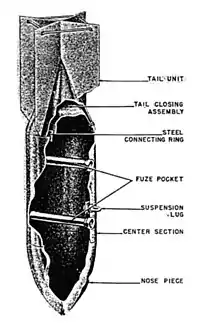SC 500 bomb
The SC 500 (Sprengbombe Cylindrisch) or cylindrical explosive bomb in English was a family of general-purpose bombs used by the Luftwaffe during World War II.
| SC 500 | |
|---|---|
 | |
| Type | General-purpose bomb |
| Place of origin | |
| Service history | |
| Used by | Luftwaffe |
| Wars | World War II |
| Production history | |
| Variants | K, L2, J |
| Specifications | |
| Mass | 500 kg (1,100 lb) |
| Length | 2.03 m (6 ft 8 in) |
| Diameter | 457 mm (18 in)[1] |
| Warhead | Amatol TNT Trialen |
| Warhead weight | 220 kg (490 lb)[1] |
Design

They had three-piece drawn steel bodies with a heavy machined nose cap for armor penetration. At the other end was a base plate, just forward of which the magnesium alloy tail was tack welded onto the body, and also bolted to the tail attachment brace. The bombs were filled through the base with either Amatol, TNT or Trialen 105, a mixture of 15% RDX, 70% TNT and 15% aluminum powder. Around the nose of the bomb was a kopfring - a metal ring, triangular in cross section, designed to prevent ground penetration or to stop forward momentum when hitting water. The bomb could also be fitted with a Stabo Spike which was an anti-ricochet device that prevented the bomb from burying itself too deep to increase its anti-personnel effectiveness. The bomb was attached to the aircraft horizontally by a H-type suspension lug. It could be horizontally suspended in a bomb bay or horizontally mounted on a wing or fuselage hardpoint.[1]
References
- "LUFTWAFFE RESOURCE CENTER". Warbirds Resource Group. 2018. Retrieved 27 February 2018.
